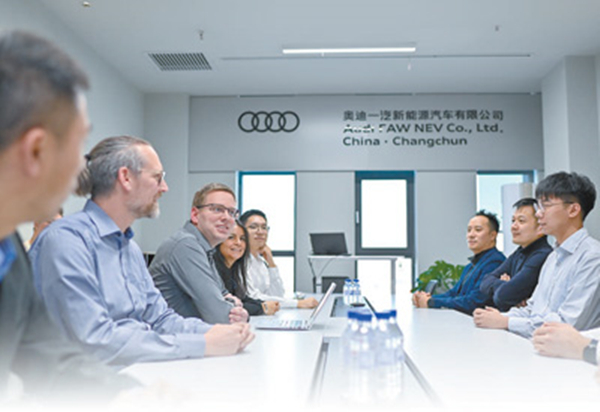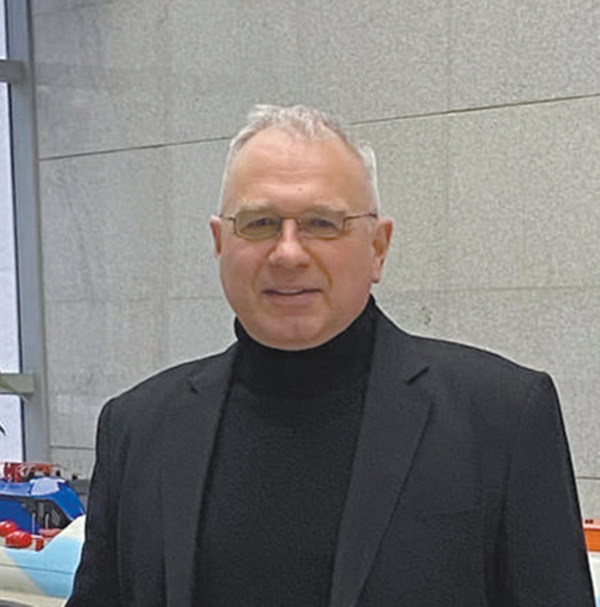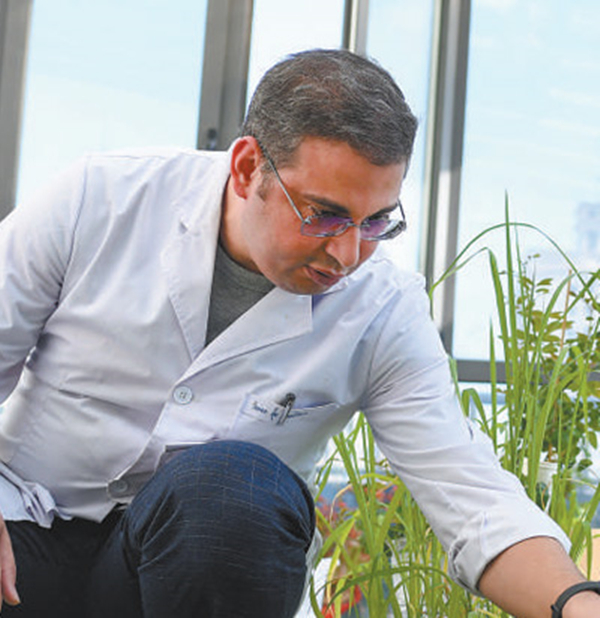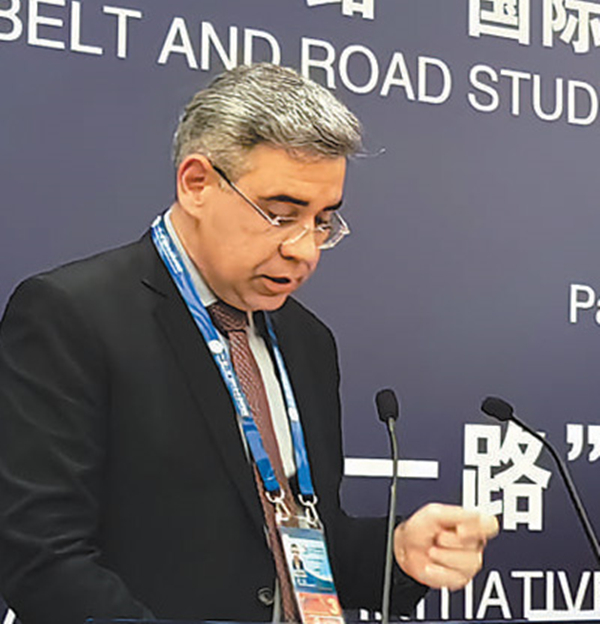Recipients of the 2023 Chinese Government Friendship Award—Driving China's Progress and Promoting Global Exchange and Cooperation
2024-03-25

The Medal of the Chinese Government Friendship Award.
Photo by ZHUANG Xiaoshu
In recent years, a growing number of foreign experts have acknowledged the developmental prospects and choose to reside and work in China. The picture shows German engineer Sasha (third from the left) and his wife Johanna (fourth from the left) convening in the meeting room of Audi FAW NEV Co., Ltd. in Changchun, Jilin Province.

Photo by YAN Linyun/Xinhua

Robert Gedler.
Photo by ZHANG Jianyong

Osama Abdalla Abdelshafy Mohamad.
Photo courtesy of the interviewee

Evandro Carvalho.
Photo courtesy of the interviewee

On March 12, a voluntary tree planting event took place in Leidian Town, Deqing County, Huzhou City, Zhejiang Province. The photo shows Party member volunteers, foreign experts, and international friends planting saplings. (Photo by LI Xuan/visual.people.cn)
Foreign experts actively participate in China’s development and play a crucial role in fostering exchanges and cooperation between China and other countries. Recently, our correspondent interviewed three recipients of the 2023 Chinese Government Friendship Award. They conveyed that China is a land brimming with abundant opportunities for development and expressed their enthusiasm to continue serving as ambassadors of friendship, contributing to China’s modernization and telling China’s story well.
Robert Gedler, a technical expert from Austria—
"This has already become my second home”.
"Winning the Chinese Government Friendship Award is a milestone in my life!” exclaimed Robert Gedler, welding director at CRRC Zhuzhou Locomotive Co., Ltd. (“CRRC ZELC”), "I immediately shared the good news with my friends and family in Austria.”
Gedler is a seasoned technical expert in the welding field of global rail transit equipment and a member of the European Standardization Committee. Since 2001, he has been stationed in Beijing, Changchun, Jilin, and Zhuzhou, Hunan, actively participating in and witnessing the recent development and progress of China’s rail transit equipment.
Welding technology is a cornerstone in the manufacturing process of rail transit equipment, with the quality of welding directly influencing the operational safety of rail transit vehicles. “When I first joined CRRC ZELC in 2015, the company predominantly relied on conventional welding techniques. Today, we possess one of the world’s most advanced welding workshops, fully automated and digitized,” said Geder. He emphasized that the ongoing advancements in welding technology is a testament to China’s breakthroughs in the realm of rail transit equipment manufacturing.
For a long time, only imported high-performance aluminum alloy welding wires have been used to weld rail transit aluminum alloy car bodies in China. In 2019, Gedler led a team to carry out domestic research and development of high-performance aluminum alloy welding wires. After a year and a half of extensive investigation, testing, selection, and refinement, the first batch of domestically-produced high-performance aluminum alloy welding wires was successfully deployed by the end of 2020. “Technological innovation is a solution to challenges. China’s rail transit industry values technological innovation greatly and continues to increase investment in research and development, demonstrating robust research capabilities and manufacturing prowess,” remarked Gedler.
He was particularly impressed by China’s integrated industrial chain and comprehensive supply system in the rail transit sector, stating, “Taking Zhuzhou as an example, the scale and production capacity of CRRC ZELC’s manufacturing base surpasses the combined scale and capacity of major European and American production bases. With over 400 enterprises in related industrial chains concentrated here, quick acquisition of all necessary accessories and materials ensures a stable and smooth industrial and supply chain. This has created unique advantages and competitiveness for the development of China’s rail transit equipment manufacturing.”
"China has made remarkable achievements in the field of rail transit, from building the world’s largest high-speed railway network to annually expanding urban rail transit operating mileage,” he stated. In his perspective, China’s rail transit industry has swiftly ascended to a world-leading level, providing tangible convenience and benefits to the populace. “Today, people are accustomed to taking subways and high-speed trains, which reduced travel time and improved travel efficiency.”
In recent years, Chinese rail transit equipment manufacturers, including CRRC ZELC, have actively expanded their global footprint by exporting their products to countries such as Germany, Serbia, Mexico, and Pakistan, contributing to the development of local rail transit industries. “I’m exceedingly proud and gratified to see the successful application of rail transit equipment developed by my team in other countries. China’s remarkable capacity for innovation has garnered international acclaim. It is my hope that these projects will foster technological exchanges, cooperation, and propel the advancement of the global rail transit industry,” said Gedler.
In his spare time, Gedler enjoys recreational bicycling within the urban landscape of Zhuzhou. “Zhuzhou has a favorable urban environment, and cycling along its roads brings a sense of relaxation and joy,” commented Gedler. According to him, the company frequently organizes cultural experiences for foreign employees, including Chinese language lessons and visits to historical sites. “My colleagues in China are also very friendly. We often gather for tea on weekends, and they introduce me to the art of Chinese calligraphy.”
"I am becoming more and more acclimated to life in China, which has truly become my second home,” expressed Gedler. He noted that China has introduced a new version of the permanent residence ID card for foreigners and issued A Guide to Working and Living in China as Business Expatriates, which has significantly improved the convenience of transportation, daily life, and consumption for foreign residents in China. “In the future, I plan to remain in China and contribute to the high-quality development of the country’s rail transit equipment industry.”
Osama Abdalla Abdelshafy Mohamad, an endophyte expert from Egypt—
"I am an expert ‘Made in China’."
"I’m planning to return to Egypt in the near future, share the joy of receiving the Chinese Government Friendship Award with my friends and family, and share my experiences about China to a wider audience in Egypt,” stated Osama Abdalla Abdelshafy Mohamad, a distinguished associate researcher at the Xinjiang Institute of Ecology and Geography, Chinese Academy of Sciences (“XIEG”). Having dedicated over a decade to studying and working in China, he expressed immense pride in participating in and witnessing China’s strides in scientific and technological innovation, as well as its economic and social development.
Osama’s journey with China began in 2008 when he enrolled at Northwest A&F University in China to pursue a PhD in environmental science. Reflecting on his decision, he noted that after extensively reviewing numerous papers and reports in Egypt, he realized that many research findings originated from China. “China is rapidly advancing in the field of science and technology, so I decided to pursue my studies here,” he stated, also expressing that studying in China has elevated his scientific research abilities to a higher level. “China has honed my skills in scientific research, and I proudly consider myself an expert in ‘Made in China’."
Shortly after returning to Egypt in 2014, Osama embarked on academic research at the XIEG under the Outstanding Young Scientists Visiting China Program. “Xinjiang, China, and Egypt share many similarities in terms of natural environment, which aligns well with my research direction. The head of the microbial research team is an exceptionally skilled expert in this field, so I came here without any hesitation,” he explained.
Currently, Osama is engaged in research on endophytes, salinized soil improvement, and arid zone agriculture. Before coming to Xinjiang, he had acquainted himself with the work done in the improvement of saline-alkali land in the region. “For example, we use bio-organic fertilizer and grow ‘salt-tolerant’ plants. I hope these research findings can serve as a reference for Egypt.” At the XIEG, Osama noted China has attached great importance to scientific research. “China’s superiority in experimental equipment, academic environment, and investment in research funds surpasses that of other countries. Here, I have participated in many scientific research projects, further elevating my academic research proficiency.”
Osama has achieved notable milestones in the exploration and functional application of microbial resources in extreme environments in arid regions. His contributions include the publication of three new orders, six new families, and several new genera and species of bacterial actinomycetes. Currently, he has identified multiple disease-resistant and growth-promoting strains that hold promise for crop development, potentially benefiting agricultural production in arid regions of both China and Egypt. Recognizing his accomplishments, Osama, as a young foreign scholar, was honored with the Young Scientist International Partner Award by the Chinese Academy of Sciences in 2020.
Beyond his scientific achievements, Osama has been instrumental in fostering scientific collaboration between Egypt and China. Through his efforts, the XIEG and El Arish University in Egypt have formalized a memorandum of cooperation. Currently, they are actively preparing for the establishment of a joint laboratory, which is poised to facilitate greater opportunities for researchers from both countries to exchange ideas. In 2021, Osama was honored with the Tianshan Prize for Foreign Experts in the Xinjiang Uygur Autonomous Region, the highest recognition granted to foreign experts who have made remarkable contributions to Xinjiang’s development.
Every time he returns to Egypt, Osama shares his experiences in China and imparts his knowledge about the country to his fellow compatriots. He mentioned that there is a growing trend of Egyptian scholars undertaking scientific research in China. The collaborative efforts in constructing the Belt and Road Initiative (BRI) facilitate international exchanges and cooperation in science and technology, fostering a bridge of friendship for mutual learning and people-to-people connections. Osama believes that academic exchanges between Egypt and China will continue to deepen.
In commemoration of his emotional connection with China, Osama adopted the Chinese name Jin Shan, derived from the pyramids of Egypt and Mount Tianshan in China. “I’m partly Chinese,” Osama remarked with a smile, revealing that he had obtained a permanent residency permit in China last May. “I am deeply grateful for everything China has given me, and I plan to continue my academic research in China for a long time to come.”
Evandro Carvalho, Brazilian expert on China—
"Continue to tell China’s story well.”
"During the annual sessions of China’s National People’s Congress and the Chinese Political Consultative Conference, I am at my busiest, as Brazilian and Chinese media frequently request interviews,” shared Evandro Carvalho, Brazil’s China specialist, who had just completed an interview when approached by the reporter. He smiled and remarked that the Two Sessions exemplify China’s people’s democracy throughout the entire process, offering an essential window for the international community to observe China’s modernization of national governance. “Even though it can be tiring, I hope to contribute my part in helping the world better understand China in this new era.”
Carvalho has extensive experience in law and education in Brazil, having served as a professor of international law at the Vargas Foundation, South America’s largest think tank, in Brazil, and at the Universidade Federal Fluminense. “I first got to know China because I was interested in the Chinese language. However, merely reading books about China wasn’t enough. My desire to experience China firsthand continued to grow,” he explained. In 2013, Carvalho participated in an exchange program and visited the Shanghai University of Finance and Economics and the Center of BRICS Countries Studies at Fudan University. “Finally, my dream came true.”
Since then, Carvalho has frequently traveled between Brazil and China, considering it his important mission to promote exchanges and cooperation between Brazil, China, and Latin America. “China and Brazil are the largest developing countries and key emerging markets in the Eastern and Western hemispheres, respectively. Besides, China has been Brazil’s largest trading partner for over a decade. More Brazilians need to understand and acquaint themselves with China,” he emphasized. Through Carvalho’s persistent efforts, the Vargas Foundation established the Brazil-China Research Center, and the Center of BRICS Countries Studies at the Universidade Federal Fluminense was officially inaugurated. He also recommended many Brazilian students to pursue studies in China. “I really hope they have the opportunity to visit China, and I am confident they will gain a lot of invaluable experiences.”
Having traveled to many parts of China, Carvalho has accumulated a wealth of experiences: strolling through the streets of Beijing, immersing himself in the allure of traditional culture while witnessing the distinctive backdrop of China’s high-quality development; visiting the Memorial Hall of the First National Congress of the Communist Party of China in Shanghai, marveling at the original aspirations and mission of Chinese communists; and capturing memories with the magnificent Hong Kong– Zhuhai–Macau Bridge in Zhuhai, Guangdong Province, to witness the extraordinary achievements of Chinese modernization. Carvalho has a habit of sharing his observations from various places in China on social media. “Look at this. China’s high-speed railway is very popular in Brazil, so many people liked this post and left a comment on it,” he remarked as he showed videos of China’s fast and punctual high-speed trains on his mobile phone to the reporter.
During the conversation with Carvalho, his profound understanding of China’s history and culture, national characteristics, and development trajectory left a lasting impression. As one of the earliest scholars in Brazil to study the BRI, Carvalho has been instrumental in organizing numerous seminars on co-building the BRI, including initiatives at the Vargas Foundation and other research institutions. “Integrating the BRI into Vargas Foundation’s research projects is of great significance. The initiative strongly advocates connectivity and serves as an important driving force for building a community with a shared future for mankind,” said Carvalho.
Since 2015, Carvalho has served as the executive editor-in-chief of China Today (Portuguese edition) at the Center for the Americas, China International Communications Group. He is actively involved in content planning for the magazine and has played a key role in establishing the Portuguese website and social media accounts of China Today. These platforms serve as crucial channels for Brazilian readers to gain insights into China, offering an authentic, multi-dimensional, and comprehensive perspective. At the beginning of this year, Carvalho started a podcast, inviting young people from Brazil and China to share their experiences and stories about studying in China through dialogue, aiming to foster mutual understanding and exchange between Brazilian and Chinese youth. “State-to-state relations are built upon friendship between the people, and fostering mutual understanding is the bedrock of such friendship. My hope is that the peoples of Brazil and China can learn from one another and strengthen their bond of friendship,” he expressed.
“Winning the Chinese Government Friendship Award is a new beginning for me and inspires me to continue to tell China’s story well,” remarked Carvalho. In his opinion, the year 2024 holds exceptional significance for China–Brazil relations. “With the 50th anniversary of diplomatic ties between Brazil and China on the horizon, I eagerly anticipate continuously contributing to the advancement of exchanges and cooperation between Brazil and China, further fostering bilateral relations.” (People’s Daily reporters: DAI Kairan, LI Yanan, ZHANG Yuannan, and DAI Yuan)



